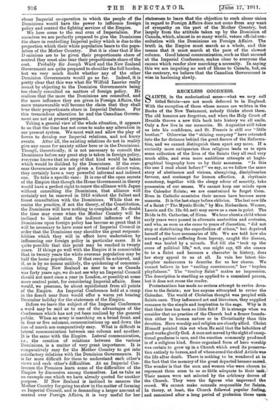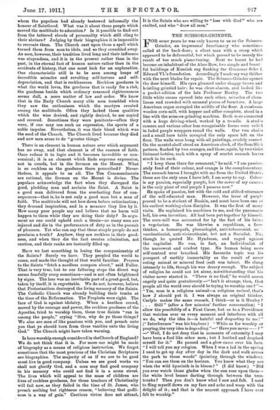RECKLESS GOODNESS.
SAINTS, in the ecclesiastical sense—what we may call titled Saints—are not much deferred to in England. With the exception of those whose names are written in the Books of the New Testament, nobody thinks about them. The old honours are forgotten, and when the Holy Court of Heralds throws a new title back into history we all smile. Only a few live in our memories. St. Augustine still takes us into his confidence, and St. Francis is still our "little brother." Otherwise the " shining company " have retreated into the far distance behind the great fissure of the Reforma- tion, and we cannot distinguish them apart any more. If a curiosity more antiquarian than religions leads us to open some collection of the lives of the Saints they all read very much alike, and even more ambitious attempts at hagio- graphical biography bore us by their sameness. "Is this the one I read about before " we say, as we follow the same story of abstinence and visions, almsgiving, disciplinarian fervour, and contempt for human affection. A rhythmic monotony, together with the sleepy odour of sanctity, take possession of our senses. We cannot keep our minds upon the Calendar Saints; we are constrained to forget them. Even in Catholic countries their names have become mere mascots. It is the last stage before oblivion. The last new life of a Saint (" The Mystic Bride," by Mrs. Richardson. Werner, Laurie and Co. 12s. 6d. net) may serve as a case in point. The Bride is St. Catherine, of Siena.. We hear about a child whose early years were passed in alternate austerities and ecstasies, and who, as soon as she came to years of discretion, " did not stop at distributing the superfluities of others," but deprived herself of the bare necessaries of life. We are told how she nursed a patient suffering from leprosy, caught the disease, and was healed by a miracle. Not till she " took up the cross of political life," not, one might say, till she ceases to be a. Saint and becomes a character in history, does her story appeal to us at all. In vain her latest . bio- grapher endeavours to describe for us her charm. We cannot believe in her " smiling countenance," her " hoyden playfulness." The "tomboy Saint" makes no impression. The description is startling as applied to a canonized person, but it does not rouse the reader.
Protestantism has made no serious attempt to revive devo- tion to the Saints ; nor has anyone attempted to revise the Calendar. The world of Christian thought was peopled with Saints once. They influenced art and literature, they supplied romance to the simple and inspiration to the sage. Why is it that their loss has been so little felt P It is strange when we consider that no practice of the Church had a firmer founda- tion either in human nature or in Christianity than this devotion. Hero worship and religion are closely allied. Christ Himself pointed this out when He said that the beholders of good works glorify God. A man not moved by the sight of excep- tional goodness is rare, and the emotion commonly produced is of a religious kind. Some organized form of hero worship was certain to grow up in a Church which owed its preserva- tion entirely to heroes, and of whose creed the chief Article was the life after death. There is nothing to be _ wondered at in the fact that the memory of the great departed became sacred. The wonder is that the men and women who were chosen to represent them seem to us so little adequate to their task. Their names were not selected by the arbitrary decree of the Church. They were the figures who impressed the crowd. We cannot make councils responsible for Saints. In theory, at least, the Church followed popular feeling, and canonized after a long period of probation those upon
whom the populace had already bestowed informally the honour of Sainthood. What was it about these people which moved the multitude to adoration ? Is it possible to find out from the tattered shreds of personality which still cling to their shrines P Judging by their biographies it is impossible to recreate them. The Church cast upon them a spell which turned them from men to idols, and so they crumbled away. As men, however, their tradition lived long and their influence was stupendous, and it is in the present rather than in the past, in the eternal fact of human nature rather than in the accidents of history, that one must look for an explanation. One characteristic still is to be seen among heaps of incredible miracles and revolting self-torture and self- depreciation, and that is recklessness. Reckless goodness is what the world loves, the goodness that is ready for a risk, the goodness beside which ordinary reasoned righteousness seems dull, a mere matter of law and order. We know that in the Early Church many able men trembled when they saw the enthusiasm which the martyrs created among the multitude. Often they lacked those qualities which the wise desired, and rightly desired, to see copied and revered. Sometimes they were penitents—often they were, if one may use such an expression, the sports of a noble impulse. Nevertheless, it was their blood which was the seed of the Church. The Church lived because they died and new men arose to do "greater things."
There is an element in human nature over which argument has no sway, and that element is of the essence of faith. Once reduce it to logic and it becomes incredible or non- sensical ; it is an element which finds supreme expression, not in creeds, but in the Sermon on the Mount. What is so reckless as the goodness there prescribed P Never- theless, it appeals to us all. The Ten Commandments are rational, the Sermon on the Mount is divine. The populace acknowledge the fact when they disregard the good, plodding man and acclaim the Saint. A Saint is a good man delivered from the everlasting fear of con- sequences—that is, he is not only a good man but a man of faith. The multitude will not bow down before ratiocination; they demand inspiration, and in a measure they live by it. How many poor people say and believe that no harm will happen to them while they are doing their duty P In argu- ment no one could uphold such a thesis—as many men are injured and die in the performance of duty as in the pursuit of pleasure. Yet who can say that these simple people do not proclaim a truth P Anyhow, they are reckless in their good- ness, and when they die the fact creates admiration, not caution, and their ranks are instantly filled up.
Have we lost something in losing the companionship of the Saints ? Surely we have. They peopled the world to come, and made the thought of that world familiar. Prayers to the Saints "fetch a needless compass about," said Fuller. That is very true, but to our faltering steps the direct way seems fearfully steep sometimes—and is not often brightened by signs. The loss was an inevitable part of a great good, but, taken by itself, it is regrettable. We do not, however, believe that Protestantism destroyed the living memory of the Saints. The Catholic Church was already building their tombs at the time of the Reformation. The Prophets were right. The face of God is against idolatry. When a heathen crowd, moved by the courage and power, the reckless goodness of the Apostles, tried to worship them, these true Saints "ran in among the people," crying " Sirs, why do ye these things P We also are men of like passions with you, and preach unto you that ye should turn from these vanities unto the living God." The Church might have taken warning.
Is hero worship enough considered in theChurch of England? We do not think that it is. Far more use might be made of biography as a means of religious instruction. We forget sometimes that the most precious of the Christian Scriptures are biographies. The majority of us if we are to be good must live in good company. Unless we see good works we shall not glorify God, and a man may find good company in his memory who could not find it in a mean street. The lives which will appeal to the mass of children are lives of reckless goodness, for those teachers of Christianity will fail now, as they failed in the time of St. James, who preach nothing but righteous reason, "believing that godli- ness is a way of gain." Cautious virtue does not attract. It is the Saints who are willing to " lose with God" who are exalted, and who " draw all men."











































 Previous page
Previous page